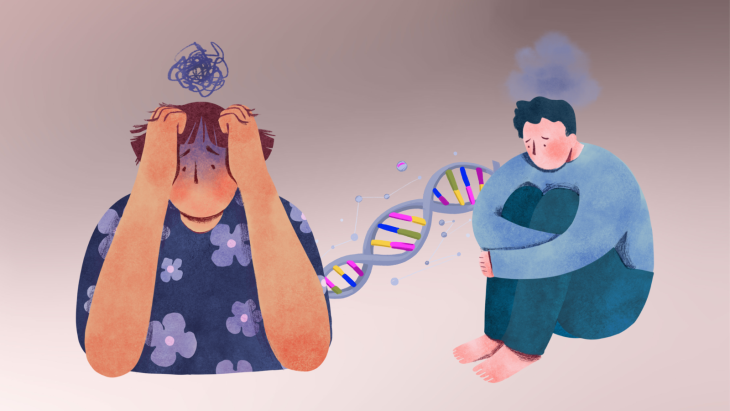Recent Posts
Most Popular
How does genetics influence mental health and the risk of mental illness?

Moment by moment, our genes interact with the environment we live in.
Humans across a lifespan are not static, but are changing, responding and growing. When it comes to mental health, how much of what we express now are because of our DNA make up and how much is from a direct result of the environment we were nurtured?
A person who has a family member with mental illness might feel concerned if it increases their risk of developing the same thing.
The National Institute of Mental Health estimates that almost 3 in 10 adults in the US and 1 in 10 children are diagnosed with a mental disorder per year.
These mental disorders that affect the US population include:
- Bipolar disorder. (3%)
- Schizophrenia. (1%)
- Depression. (10%)
- Attention Deficit-Hyperactivity Disorder (ADHD). (5-11%)
- Autism Spectrum Disorder (ASD). (1 in 68 children)
The mental health and genetics link
It has also been noted that some mental disorders seem to run in families. For example, different studies, though showing some difference in number, show the link between genes and conditions such as schizophrenia or bipolar disorder.
Schizophrenia
There is a 1 in 100 chance that someone may develop schizophrenia in their lifetime. But this number increases to 6 in 100 when one parent has schizophrenia. The number even shoots up to 45 in 100 when both parents have the condition. Having a sibling with schizophrenia makes the chance 9 in 100, while it is 50 in 100 if an identical twin has it.
About 80% of schizophrenia cases are genetically linked.
Bipolar Disorder
A person in the general population has a 1 in 100 chance of developing bipolar disorder. If a parent has it, the chance is raised to 10 in 100, and to 40 in 100 if both parents have bipolar disorder. If your brother or sister is affected by bipolar disorder, you might have a 13 in 100 chance of getting it too, and that number can reach to 70 in 100 in identical twins.
It is estimated that in 10% of cases, it is the environment that causes bipolar disorder, and the 90% of cases are from genetic factors.
As our scientific knowledge about genes continues to grow, scientists have had a clearer idea of how genes influence mental illness.
For example, latest research indicates that mutations in genes cause malfunction in the development of connections between brain cells or a group of brain cells. Depending on what genes are affected and the degree of mutations, the degree to which mental illnesses are expressed also changes.
These changes in the genes may be inherited from a parent affected by the mutation, or genes may undergo changes during the development of a germ cell ( egg or sperm).
Right now, genetic testing is not an accurate predictor of our risk for developing mental disorders. Rather, in order to assess our risk, we can learn more about our family mental health history. Your older relatives may have health history knowledge. Also, talking with a mental health professional may help you approach the matter with reliable information.
With all these being said, many other factors play a role in the risk for mental disorders. It has been proven that environmental factors certainly play a significant part in increasing the risk for and the development of mental illnesses.
And the goal of understanding the link between the two is to be able to work together to come up with ways to help people with mental health disorders achieve better health outcomes and live a functional and full life.
Connect with mental health opportunities such as mental health therapist, psychologist, and mental health counselor jobs across the U.S. and start a rewarding career in the healthcare industry!








Comments